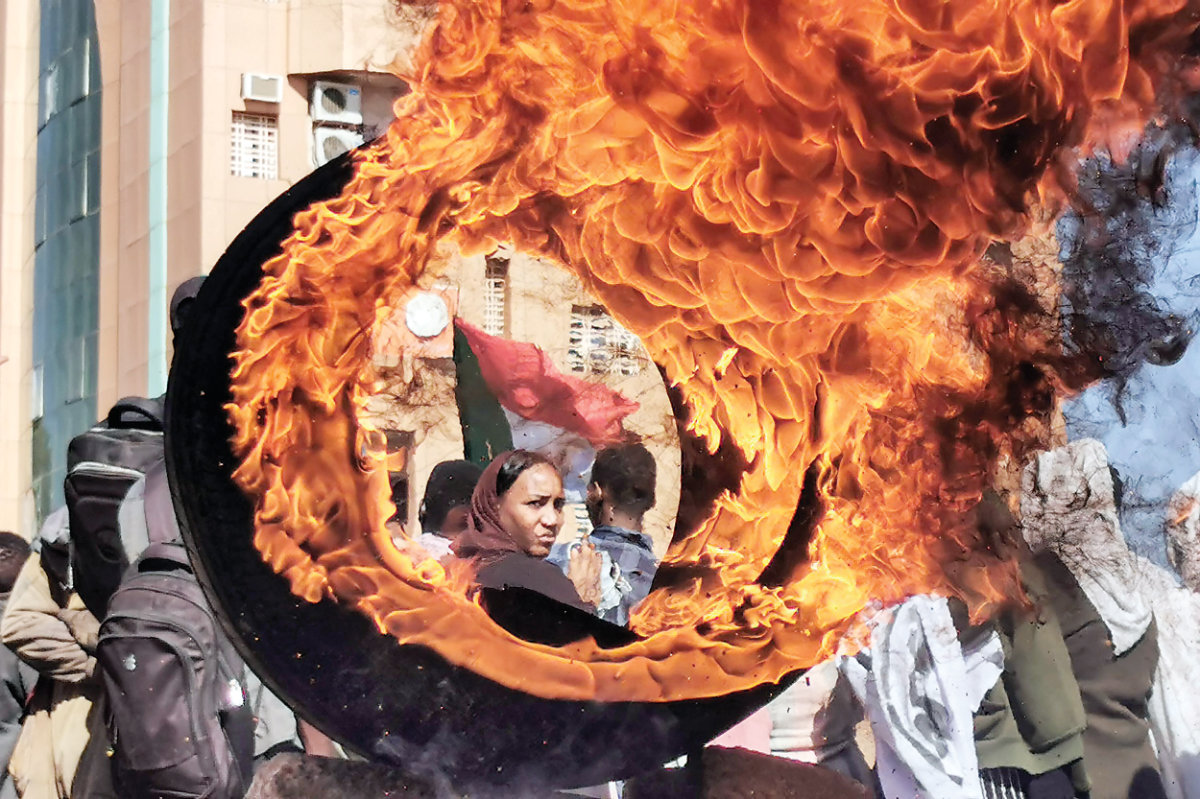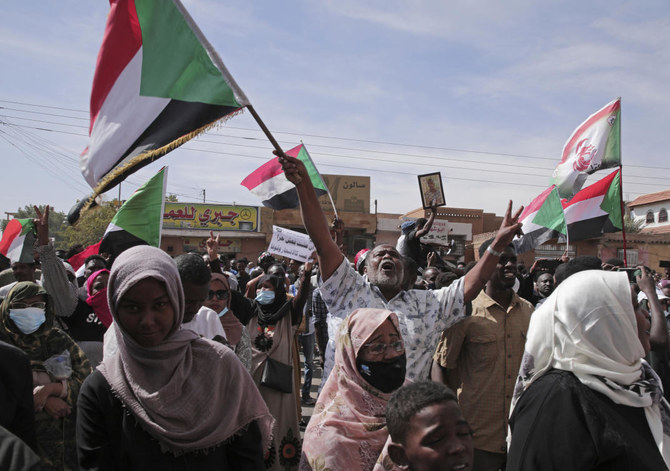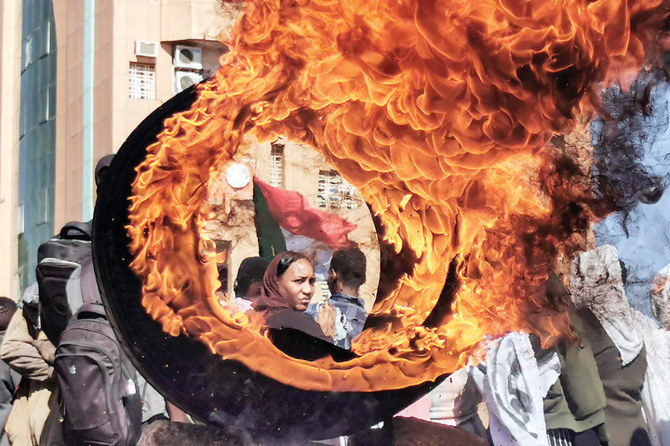KHARTOUM/JEDDAH: Sudan descended further into chaos on Tuesday as protesters took to the streets again to demand an end to a military coup and the establishment of a civilian government.
Up to 60 people have died in a security crackdown on demonstrations that began after the Oct. 25 coup, and intensified this week after the resignation of Abdalla Hamdok as prime minister.
Thousands of protesters took part in marches on Tuesday in Khartoum and its twin city of Omdurman. Young demonstrators sang, beat drums, waved Sudanese flags and set fire to tires.
They shouted “No, no to military rule” and called for the disbandment of Sudan’s ruling council headed by Gen. Abdel Fattah Al-Burhan, who led the coup.
Mobile internet access was blocked, and streets leading to the presidential palace and army headquarters were sealed off by troops, riot police and paramilitary units, who fired tear-gas grenades at the protesters.
Burhan had dismissed both Hamdok and the government in the October coup, dismantling a precarious power-sharing arrangement between the military and civilians that had been established in the wake of the April 2019 ouster of longtime autocrat Omar-al-Bashir.
The military chief reinstated Hamdok on November 21, a deal the prime minister accepted partly on the promise of elections in mid-2023 — but the protest movement slammed the deal as a “betrayal” and kept up its rallies.

The demos were called by a local ‘resistance committee’ in khartoum’s twin city of omdurman in response to the killing of several protesters there on thursday and sunday. (AFP)
Hamdok then resigned on Sunday — six weeks after he was reappointed by Burhan — saying the country was at a “dangerous crossroads threatening its very survival.”
“Our three current terms after the coup are: No negotiations, no power-sharing and no compromise, in addition to the main demands of the revolution, which are freedom, peace and justice. That’s it, we have no other demands,” said protester Waddah Hussein.
Hamdok’s resignation has thrown the country into further uncertainty and “deprived the generals of the fig leaf” they used to continue their military rule, said Mohammed Yousef Al-Mustafa, a spokesman for the Sudanese Professionals’ Association, which was the backbone of the uprising that deposed dictator Omar Bashir in 2019.
The protest movement insists on a fully civilian government to lead the transition, a demand rejected by the generals who say power will be handed over only to an elected government. Elections are planned in July 2023, in line with a constitutional document governing the transitional period.
Sudan’s largest Umma Party urged the military to relinquish leadership of the sovereign council. “This is the only way for the salvation of the nation, the integrity of the transitional period and the accomplishment of its tasks within the agreed-upon time frame,” the party said.
Talks have been underway to find an independent figure to lead a technocratic Cabinet through elections. Among names floated was that of former Finance Minister Ibrahim Elbadawi, who resigned in 2020.
Jibril Ibrahim, a rebel leader who joined Hamdok’s government last year following a peace deal with the transitional administration, called for a political compromise to resolve the crisis.
“Let us agree to work together for the sake of Sudan,” he said.
FASTFACT
Up to 60 people have died in a security crackdown on demonstrations that began after the Oct. 25 coup.
On Tuesday, the US, European Union, Britain and Norway warned the military against naming their own successor to Hamdok, saying it would “not support a prime minister or government appointed without the involvement of a broad range of civilian stakeholders.”
The four Western powers said that they still believed in the democratic transition of Sudan, but issued a veiled warning to the military if it does not move forward.
“In the absence of progress, we would look to accelerate efforts to hold those actors impeding the democratic process accountable,” the statement read.
“Unilateral action to appoint a new prime minister and cabinet would undermine those institutions’ credibility and risks plunging the nation into conflict,” it added.
UN chief Antonio Guterres “regrets that a political understanding on the way forward is not in place despite the gravity of the situation in Sudan,” UN spokesman Stephane Dujarric said Monday.
On Tuesday, Burhan met with US Charge d’Affairs Brian Shukan, stressing the need to “continue dialogue between all sides to come up with a national consensus program,” according to a statement by Burhan’s office.
His office also said he had met with UN special representative Volker Perthes over “the current political situation” and discussed “speeding up the appointment of a new prime minister.”
Arab League chief Ahmed Aboul Gheit said Tuesday that he “respects” Hamdok’s decision and called for “urgent action” to resolve the crisis.
Activists online have urged demonstrators to keep heading to the presidential palace “until victory is achieved,” according to the Sudanese Professionals Association, an alliance of independent trade unions that was instrumental in the anti-Bashir protests.
The coup — one of several in Sudan’s post-independence history — has triggered mass demonstrations and a bloody crackdown that has left at least 57 people dead and hundreds wounded, according to the independent Doctors’ Committee.
On Tuesday, security forces fired tear gas near the palace, as well as at rallies in suburbs north of Khartoum and in the eastern city of Port Sudan.
Protesters also gathered in Khartoum’s twin city Omdurman and the South Darfur state capital Nyala, taking the total on the streets across the country into the thousands.
Emad Mohamed, a witness in Wad Madani, south of Khartoum, said protesters carried the Sudanese flag and were beating drums as they chanted “civilian rule is the people’s choice.”
Demonstrators in east Khartoum “burnt car tires and built brick barricades on the streets,” witness Sawsan Salah said. Other protesters urged the military “to go back to the barracks.”
Protests calmed later on Tuesday evening.
(With Agencies)



























